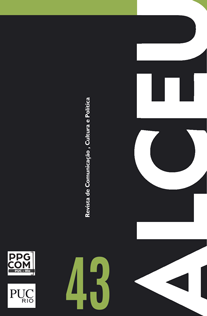Utopia, dystopia... Pandemic!
Future dreaming and temporalization of tomorrow's imagination
DOI:
https://doi.org/10.46391/ALCEU.v21.ed43.2021.208Keywords:
Utopia, Dystopia, Future, Imagination, Presentism, TemporalityAbstract
Starting from images of contemporary future’s dream, we have historically stepped back trying to map the weakening of utopian thought and rise of dystopian imagination in our present day. From genealogical gesture, we seek to elucidate how this turn would be related to a temporal experience, and how this relationship has been fructified other future images in another historical moment such as modernity. In this sense, utopia and dystopia are not simply opposed, here they are ways of imagining future closely related to power dynamics and ways of experiencing future time in nowadays. Presentism places us isolated - physically and politically - in a present suffocated by future’s predictions that expands on today that seems to repeat itself. The present becomes the space for action, although time passage is no longer associated with reaching the best place or with modern utopia that breaks out in the future to be perfected and materialized in collective project imagined for tomorrow.
Downloads
References
BENJAMIN, W. Passagens. São Paulo: Imprensa Oficial do Estado/ UFMG, 2006.
BERARDI, F. Depois do futuro. São Paulo: UBU Editora, 2019.
BLOCH, E. O princípio esperança. Rio de Janeiro: Contraponto EdUERJ, 2005.
DARDOT, P.; LAVAL, C. A nova razão do mundo: ensaio sobre a sociedade neoliberal. São Paulo: Boitempo, 2016.
DELEUZE, G. Foucault. São Paulo: Brasiliense, 1988.
FERREIRA, V. Vitor. Utopias e distopias no século XXI e pós-modernismo. Revista de Pós-graduação em Estudos de Linguagens - UFMS. Campo Grande - MS, Vol.19, nº 38. 2015.
FITTING, P. A Short History of Utopian Studies. Science Fiction Studies, v. 36, n. 1, p. 121–131, 2009.
FOUCAULT, M. Nietzsche, a genealogia e a história. In: Microfísica do Poder. Rio de Janeiro: Graal, 1979.
________________. História da sexualidade I: a vontade de saber. 13. ed. Rio de Janeiro: Graal, 1988.
________________. Nascimento da biopolítica. Curso no Collège de France: 1978-1979. São Paulo: Martins Fontes, 2008.
HARTOG, F. Regimes de historicidade: Presentismo e experiências do tempo. São Paulo: Autêntica, 2013.
JACOBY, R. Imagem imperfeita: pensamento utópico para uma época antiutópica. Rio de Janeiro: Civilização Brasileira, 2007.
KOSELLECK, R. Futuro Passado: contribuição semântica dos tempos históricos. Rio de Janeiro: PUC, 2006.
________________. Estratos do tempo: estudos sobre a história. Rio de Janeiro: Contraponto Editora PUC Rio, 2014.
LIMA, C. Genealogia dialética da utopia. Rio de Janeiro: Contraponto, 2008.
MARQUES, V. O velho está morrendo e o novo sempre vem. In: O velho está morrendo e o novo não pode nascer. São P: Autonomia Literária, 2020. p. 7–31.
NOWOTNY, H. Time: the modern and postmodern experience. Cambridge: Polity Press, 1994.
PARTINGTON, J. S. The Time Machine and A Modern Utopia: The Static and Kinetic Utopias of the Early H.G. Wells. Utopian Studies, v. 13, n. 1, p. 57–68, 2002.
SANZ, C. L.; PESSOA, M. Imagens do futuro: Risco e responsabilização na gerência neoliberal do amanhã. Tempo Social, v. 32, n. 2, p. 257–277, 2020.
SARGENT, L. T. The Three Faces of Utopianism Revisited. Utopian Studies, v. 5, n. 1, p. 1–37, 1994.
WELLS, H. G. A modern Utopia. Auckland: Floating Press, 2009.
Filmografia
AD VITAM. Direção: Thomas Cailley e Sébastien Mounier. Produção: Kilija / Arte. França: Netflix, 2018. Disponível em: https://www.netflix.com/title/81082327. Acesso em: 31/01/2021.
FILHOS da esperança. Direção: Alfonso Cuarón. Produção: Marc Abraham, Eric Newman, Hilary Shor, Iain Smith, Tony Smith. Reino Unido: Universal Pictures, 2006.
Downloads
Published
How to Cite
Issue
Section
License
Copyright (c) 2021 Revista ALCEU

This work is licensed under a Creative Commons Attribution-NonCommercial 4.0 International License.






